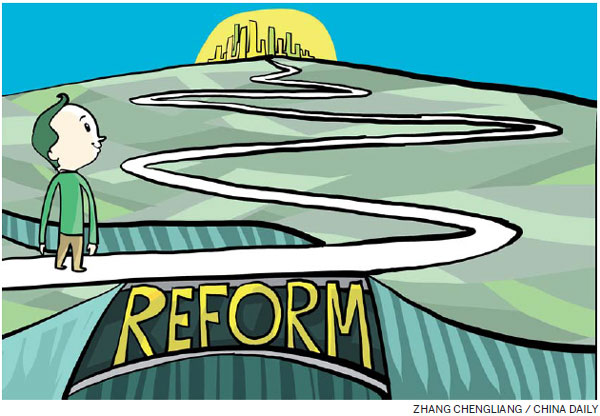
The current five-year period will be crucial in cementing long-term growth which is sustainable and inclusive. The target of at least 6.5% until 2020 presupposes a series of reforms outlined in the document. Against the backdrop of a rapidly aging population and slowing productivity growth, supply-side reforms will be needed to hold up potential growth.
At the same time, at least in the short run, macroeconomic policies need to support growth to close the output gap and realize the economy’s growth potential. China is in a lucky position of having sufficient space for monetary or fiscal stimuli if needed.
The increase in the budget deficit target to 3% is a transparent way of providing the needed stimulus to bring back the economy to its potential. Lending by policy banks will also stimulate activity, though large-scale stimulus needs to be avoided as sub-national governments recently assumed large chunks of debt accumulated by investment vehicles and enterprises are also heavily indebted.
Public investment spending should be channelled to areas where social returns are the highest and where the capital stock is low such as urban transit systems, underground structures or environmental services. Projects where commercial returns can be reaped are better left to the private sector. Thus more public funds could be directed to education, health and social security, where spending still falls short of demand.
Structural reforms are indispensable to increase the economy’s growth potential amid rapid ageing. Notwithstanding the rapid growth of total factor productivity, according to our estimation in last year’s Economic Survey of China, it is still at around 15% of the US level in manufacturing and a third of that in service industries, leaving ample room for further catching up. Some policies such as state-owned enterprise (SOE) reform, fostering innovation and improving skills could play an important role in that process.
Enhancing efficiency through reforms in the SOE sector can boost overall productivity as the SOE share is still large in several sectors, even in potentially competitive ones. Private sector entry - including both domestic and foreign - through mixed ownership or other way can boost productivity as SOEs, especially at the sub-national level, tend to be less productive.
Innovation needs to become the driving force of growth for sustainability. A major initiative, the “Made in China 2025” focuses on upgrading the manufacturing sector with specific targets in terms of catching up with frontier countries.
Diffusing innovation outputs across the economy is found to be an even bigger issue than catching up with the frontier in OECD countries. Similarly, in China, innovation outputs are rarely transferred. Recent measures to facilitate the transfer of innovation outputs are therefore welcome.
Making the Internet accessible and affordable for all and ensuring that it is fast and stable are key ingredients of the Internet Plus initiative and in general, an innovation-friendly business environment.
Providing the right skills to all could also be a large contributor to productivity growth. As estimated in the Economic Survey, there are mismatches between the skills on offer and what is required by the market, in particular in the areas of programming and soft skills. To close the skills gap, a workplace training-based vocational education system could be decisive.
The author is Head of China Desk, Economics Department of OECD (Organisation for Economic Cooperation and Development).